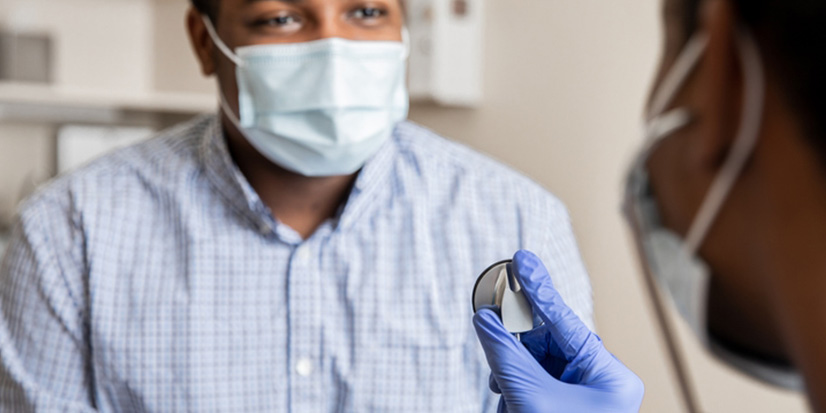COVID-19 and annual health screenings
- Category: Living Well
- Posted On:

COVID-19 should not prevent you from getting annual screenings
Believe it or not, we are coming up on the year anniversary of COVID-19. Who would have known in early March 2020 what was about to occur? For a year, we’ve been in the midst of a health crisis, and yet, health professionals say another one may be on the horizon, and it’s due to people forgoing yearly health screenings and check-ups. March is Colorectal Cancer Awareness Month, and if you are due for your annual colonoscopy, or if you are having any symptoms, don’t put off a visit to the doctor because this cancer is deadly if not detected early.
Screening is the first line of defense against colorectal cancer
Colorectal cancer starts when cells mutate and grow out of control and create what are known as polyps, which are clumps of tissue that form in the colon or rectum's inner lining. Every year more than 140,000 people are diagnosed with colorectal cancer, and more than 50,000 people die.
The best way of detecting this cancer early is by screening, which involves an outpatient procedure known as a colonoscopy. During this procedure, a patient is lightly sedated while a doctor uses a small flexible tube to detect abnormalities or polyps in the colon or rectum. If anything is found, it is removed and sent to a lab for testing. This screening is vital in catching this type of cancer early because colorectal cancer occurs quietly in the body with little to no symptoms until it has progressed.
What has doctors worried right now is that due the ongoing coronavirus, many people have not scheduled preventative cancer screenings. According to a study by the Epic Health Research Network, from January through April 2020:
- Colon cancer screenings dropped 86 percent
- Breast and cervical cancer screenings dropped 94 percent
While we know much more now than a year ago about the coronavirus spread, there is still apprehension among some to schedule a doctor’s visit or procedure. While that is understandable, delaying or missing an appointment or screening may lead to a diagnosis of cancer in late stages, which can result in poorer outcomes. West Jefferson Medical Center, it’s physician offices and Outpatient Surgery Center continue to adhere to strict CDC guidelines, and that means:
- All people entering the hospital or clinic under temperature checks
- Everyone entering must wear a mask at all times
- Waiting rooms are organized to adhere to social distancing
- All patient rooms undergo a thorough cleaning after use, including surgical suites
If there is still apprehension about an in-person doctor’s appointment, you can schedule a virtual visit with your doctor to address health issues and concerns. Telehealth visits can be scheduled through the medical center’s patient portal.
Risk and symptoms of colorectal cancer
Both men and women are at risk for colorectal cancer, but there are steps you can take to stay ahead of this disease:
- Know your family history as a close relative with this type of cancer or with polyps can be an early warning sign and something your doctor needs to know
- Added risk factors are a personal history of type 2 diabetes, Crohn’s disease, or ulcerative colitis
- Know that as you age, your risk can increase; 90 percent of cancer cases occur in people who are 50 years old or older
- Review your lifestyle habits and adjust accordingly:
- Making sure you are getting regular exercise and maintain a healthy weight
- Eat healthy – have a diet that includes fruits, vegetables, and whole grains; also limit red meat
- Limiting your alcohol intake
- If you smoke, stop
- When recommended to undergo a colonoscopy, make an appointment
If you have any of the following symptoms, make sure you contact your doctor as these could be signs of colorectal issues:
- A change in bowel habits, such as diarrhea, constipation, or narrowing of the stool that lasts for more than a few days
- Have a feeling that you need to have a bowel movement that is not relieved by doing so
- Seeing rectal bleeding or dark stools that have blood present
- Feeling cramping or abdominal (belly) pain
- Unintended weight loss
 Dr. James (Jimmy) Ellis was born and raised in Old Jefferson. He graduated from St. Agnes Parochial School and Archbishop Rummel High School in Metairie, Louisiana. He completed his internal medicine residency, then a fellowship in hematology and medical oncology within the LSU system. Dr. Ellis returned home to Jefferson Parish after 19 years in practice, most recently in Thibodaux, Louisiana. His greatest joys are his four daughters. Dr. Ellis is very active in many fitness activities including karate and yoga. He also loves fishing and spending time in Grand Isle.
Dr. James (Jimmy) Ellis was born and raised in Old Jefferson. He graduated from St. Agnes Parochial School and Archbishop Rummel High School in Metairie, Louisiana. He completed his internal medicine residency, then a fellowship in hematology and medical oncology within the LSU system. Dr. Ellis returned home to Jefferson Parish after 19 years in practice, most recently in Thibodaux, Louisiana. His greatest joys are his four daughters. Dr. Ellis is very active in many fitness activities including karate and yoga. He also loves fishing and spending time in Grand Isle.